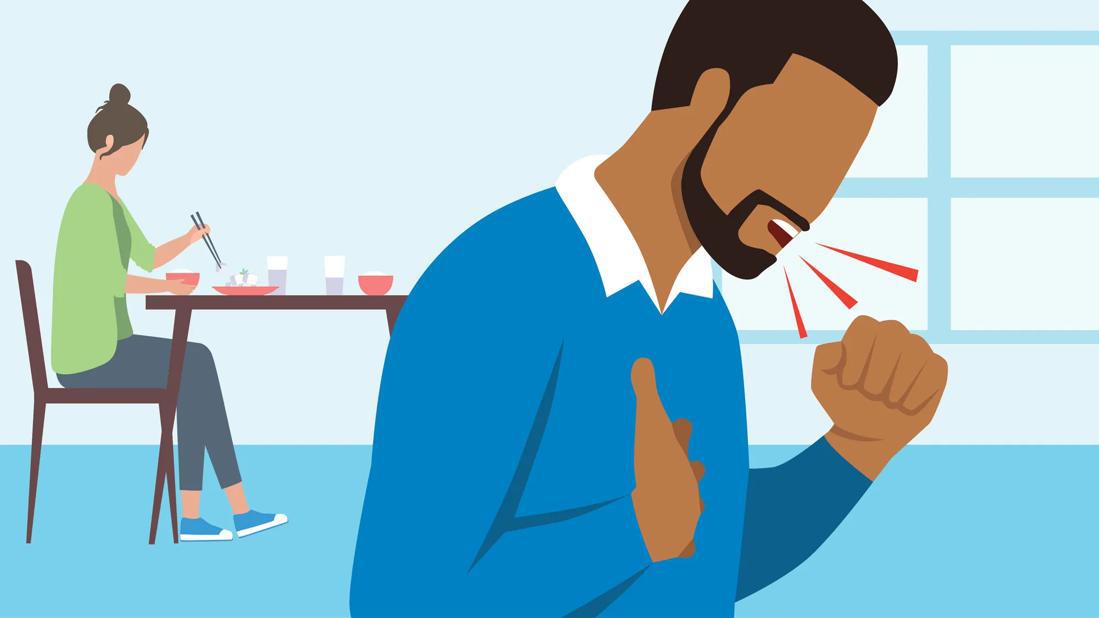What’s Going On When Something ‘Goes Down the Wrong Pipe’?
When something like food or drink goes down your windpipe rather than your esophagus, it can cause coughing and sometimes choking

We’ve all been there: One moment, you’re eating lunch, when out of nowhere, a coughing fit strikes. It soon passes, giving you some relief, but … what the heck just happened?!
When something “goes down the wrong pipe,” it means it’s been sucked into your breathing tube instead of the tube that helps you swallow food. But what exactly is going on, and why?
What happens when food goes down the wrong pipe?
What’s going on is called aspiration, which is when anything that isn’t air gets into your airways, like something you eat or drink.
Normally, the muscles in your lower throat propel food and drink into your esophagus, the muscular tube that carries it down to your stomach. But when something goes “down the wrong pipe,” it’s gotten into your windpipe (trachea) instead.
Your trachea, which is part of your airway system, carries oxygen to your lungs and carbon dioxide away from them. For the most part, nothing but air should go in or out of it, so your body works hard to help keep unwanted food, drink and saliva out. It’s a task performed in concert by your throat muscles, vocal cords and epiglottis, a handy flap above your trachea.
“Like so much about our bodies, it’s an automatic process,” explains urgent care specialist Karl Elser, DO. “But sometimes, something just slips through the wrong way. It’s more likely to happen when you’re distracted, eating quickly, or if you’re talking or laughing while you eat.”
How your body responds
When you aspirate, your body’s fight-or-flight response triggers an outpouring of adrenaline, the hormone associated with preparing for dangerous situations. Your heart rate and blood pressure spike. And usually, your body can take care of things quickly — by coughing.
“A gag or cough reflex will start automatically, and this often fixes the problem,” Dr. Elser says. “It’s your body’s way of trying to expel something that doesn’t belong.” Afterward, you may need to clear your throat a few times or sip on some water to feel normal again.
But sometimes, coughing doesn’t do the trick. In this case, food remains where it shouldn’t be, like on your vocal cords, in your trachea or even in the small airways of your lungs. When this happens, you may feel:
- A nagging tickle in your throat or the feeling that something is stuck
- Pain when swallowing or difficulty swallowing
- A frequent urge to cough after you eat or drink
Food or drink that aspirates into your lungs can lead to a bacterial infection called aspiration pneumonia, which requires medical treatment.
Is aspirating the same as choking?
Aspiration and choking aren’t the same, but they’re closely related — namely because aspiration can cause choking.
“When you aspirate, food goes someplace it shouldn’t, but it doesn’t necessarily block your airway,” Dr. Elser explains. “Food that gets into your airway can lead to a choking sensation, but you’re still able to move air in and out of the windpipe.”
Choking — especially complete choking, when your airway is fully blocked — is a medical emergency that requires immediate first aid like the Heimlich maneuver.
“It’s important to clear your airway as soon as possible,” Dr. Elser stresses.
What should you do when food goes down your windpipe?
When food goes down the wrong pipe, the feeling can range from unpleasant to downright scary. So, how should you respond?
Dr. Elser explains that coughing is your body’s natural way of removing foreign objects from your airway. So, if a coughing fit comes on, don’t try to stop it. Just let your body do what it does.
And remember to try to stay calm. Panicking can cause you to breathe faster, which can put more pressure on your trachea.
When to see a doctor
“Aspiration is usually brief, if your body can expel that foreign material right away,” Dr. Elser says. “But if you’re still coughing two to four hours after an episode of aspiration, call a doctor.”
You should also seek immediate help if you:
- Cough up blood (hemoptysis)
- Cough up brown or black-colored phlegm
- Develop a fever or chills
- Feel a sharp, stabbing chest pain
- Continue to feel like something is stuck in your throat
If you seem to have multiple episodes of aspiration — like something is constantly going down the wrong pipe — that’s also a sign to talk to a healthcare provider.
“That can be a sign of another health issue, like a vocal cord disorder, a swallowing disorder, a muscle coordination problem or even a neurological disorder,” Dr. Elser points out. “It’s important to talk about it with your primary physician, who can run tests or refer you to a specialist to figure out what’s going on.”